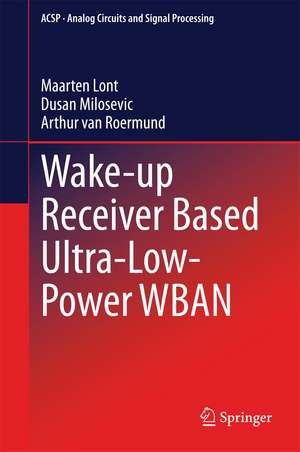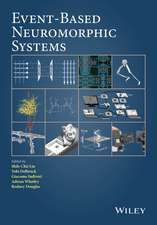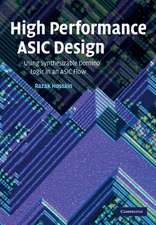Wake-up Receiver Based Ultra-Low-Power WBAN: Analog Circuits and Signal Processing
Autor Maarten Lont, Dusan Milosevic, Arthur van van Roermunden Limba Engleză Hardback – 24 iun 2014
| Toate formatele și edițiile | Preț | Express |
|---|---|---|
| Paperback (1) | 634.18 lei 43-57 zile | |
| Springer International Publishing – oct 2016 | 634.18 lei 43-57 zile | |
| Hardback (1) | 640.24 lei 43-57 zile | |
| Springer International Publishing – 24 iun 2014 | 640.24 lei 43-57 zile |
Din seria Analog Circuits and Signal Processing
- 5%
 Preț: 902.97 lei
Preț: 902.97 lei - 9%
 Preț: 628.98 lei
Preț: 628.98 lei -
 Preț: 388.34 lei
Preț: 388.34 lei - 15%
 Preț: 636.30 lei
Preț: 636.30 lei - 15%
 Preț: 636.80 lei
Preț: 636.80 lei - 18%
 Preț: 941.82 lei
Preț: 941.82 lei - 15%
 Preț: 639.08 lei
Preț: 639.08 lei - 18%
 Preț: 918.48 lei
Preț: 918.48 lei - 15%
 Preț: 631.21 lei
Preț: 631.21 lei - 15%
 Preț: 642.03 lei
Preț: 642.03 lei - 15%
 Preț: 641.85 lei
Preț: 641.85 lei - 18%
 Preț: 887.05 lei
Preț: 887.05 lei - 18%
 Preț: 944.51 lei
Preț: 944.51 lei - 15%
 Preț: 632.55 lei
Preț: 632.55 lei - 15%
 Preț: 641.03 lei
Preț: 641.03 lei - 18%
 Preț: 836.39 lei
Preț: 836.39 lei - 15%
 Preț: 642.18 lei
Preț: 642.18 lei - 15%
 Preț: 639.90 lei
Preț: 639.90 lei - 18%
 Preț: 947.85 lei
Preț: 947.85 lei - 15%
 Preț: 642.51 lei
Preț: 642.51 lei - 15%
 Preț: 631.86 lei
Preț: 631.86 lei - 15%
 Preț: 634.49 lei
Preț: 634.49 lei - 15%
 Preț: 635.47 lei
Preț: 635.47 lei - 15%
 Preț: 640.06 lei
Preț: 640.06 lei - 15%
 Preț: 631.53 lei
Preț: 631.53 lei - 15%
 Preț: 635.65 lei
Preț: 635.65 lei - 18%
 Preț: 941.50 lei
Preț: 941.50 lei - 18%
 Preț: 1112.92 lei
Preț: 1112.92 lei - 15%
 Preț: 636.30 lei
Preț: 636.30 lei - 15%
 Preț: 633.19 lei
Preț: 633.19 lei - 15%
 Preț: 635.80 lei
Preț: 635.80 lei - 18%
 Preț: 888.01 lei
Preț: 888.01 lei - 18%
 Preț: 942.76 lei
Preț: 942.76 lei - 18%
 Preț: 1387.10 lei
Preț: 1387.10 lei - 18%
 Preț: 1115.28 lei
Preț: 1115.28 lei - 15%
 Preț: 633.68 lei
Preț: 633.68 lei - 15%
 Preț: 641.03 lei
Preț: 641.03 lei - 15%
 Preț: 638.57 lei
Preț: 638.57 lei - 15%
 Preț: 642.51 lei
Preț: 642.51 lei - 18%
 Preț: 947.85 lei
Preț: 947.85 lei - 15%
 Preț: 640.71 lei
Preț: 640.71 lei - 15%
 Preț: 640.88 lei
Preț: 640.88 lei - 15%
 Preț: 631.40 lei
Preț: 631.40 lei - 18%
 Preț: 944.19 lei
Preț: 944.19 lei - 18%
 Preț: 944.67 lei
Preț: 944.67 lei - 18%
 Preț: 942.94 lei
Preț: 942.94 lei - 15%
 Preț: 641.20 lei
Preț: 641.20 lei - 20%
 Preț: 555.52 lei
Preț: 555.52 lei - 18%
 Preț: 1003.38 lei
Preț: 1003.38 lei
Preț: 640.24 lei
Preț vechi: 753.22 lei
-15% Nou
Puncte Express: 960
Preț estimativ în valută:
122.51€ • 128.23$ • 101.97£
122.51€ • 128.23$ • 101.97£
Carte tipărită la comandă
Livrare economică 31 martie-14 aprilie
Preluare comenzi: 021 569.72.76
Specificații
ISBN-13: 9783319064499
ISBN-10: 3319064495
Pagini: 168
Ilustrații: XV, 150 p. 85 illus., 53 illus. in color.
Dimensiuni: 155 x 235 x 17 mm
Greutate: 0.41 kg
Ediția:2014
Editura: Springer International Publishing
Colecția Springer
Seria Analog Circuits and Signal Processing
Locul publicării:Cham, Switzerland
ISBN-10: 3319064495
Pagini: 168
Ilustrații: XV, 150 p. 85 illus., 53 illus. in color.
Dimensiuni: 155 x 235 x 17 mm
Greutate: 0.41 kg
Ediția:2014
Editura: Springer International Publishing
Colecția Springer
Seria Analog Circuits and Signal Processing
Locul publicării:Cham, Switzerland
Public țintă
ResearchCuprins
Introduction.- Wireless Body Area Networks.- Wake-Up Receiver System Level Design.- Low-Power Zero-IF Receiver Design.- Receiver Front-End Version 1.- Receiver Front-End Version 2.- Conclusions.
Textul de pe ultima copertă
This book presents the cross-layer design and optimization of wake-up receivers for wireless body area networks (WBAN), with an emphasis on low-power circuit design. This includes the analysis of medium access control (MAC) protocols, mixer-first receiver design, and implications of receiver impairments on wideband frequency-shift-keying (FSK) receivers. Readers will learn how the overall power consumption is reduced by exploiting the characteristics of body area networks. Theoretical models presented are validated with two different receiver implementations, in 90nm and 40nm CMOS technology.
• Provides an overview of wireless body area network design from the network layer to the circuit implementation, and an overview of the cross-layer design trade-offs;
• Discusses design at both the network or MAC-layer and circuit-level, with an emphasis on circuit design;
• Covers the design of low-power frequency shift keying (FSK) wake-up-receivers;
• Validates theory presented with two different receiver implementations, in 90nm and 40nm CMOS technology.
• Provides an overview of wireless body area network design from the network layer to the circuit implementation, and an overview of the cross-layer design trade-offs;
• Discusses design at both the network or MAC-layer and circuit-level, with an emphasis on circuit design;
• Covers the design of low-power frequency shift keying (FSK) wake-up-receivers;
• Validates theory presented with two different receiver implementations, in 90nm and 40nm CMOS technology.
Caracteristici
Provides an overview of wireless body area network design from the network layer to the circuit implementation, and an overview of the cross-layer design trade-offs Discusses design at both the network or MAC-layer and circuit-level, with an emphasis on circuit design Covers the design of low-power frequency shift keying (FSK) wake-up-receivers Validates theory presented with two different receiver implementations, in 90nm and 40nm CMOS technology Includes supplementary material: sn.pub/extras










